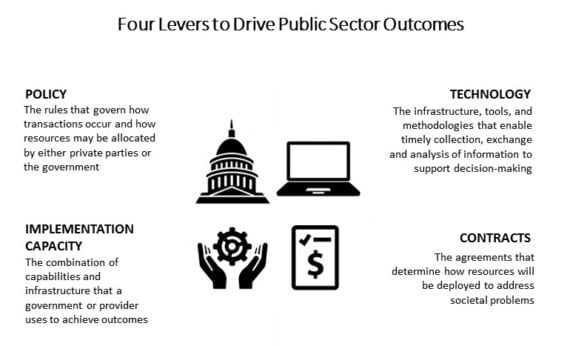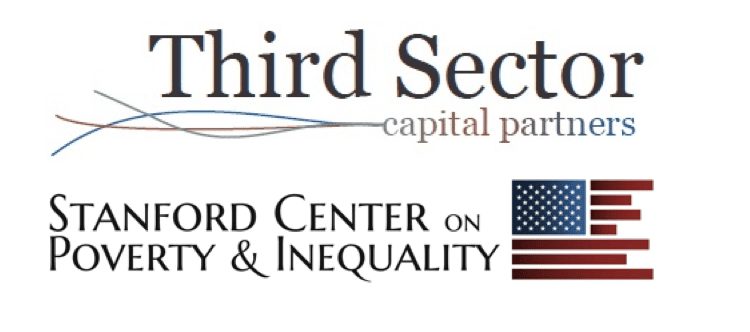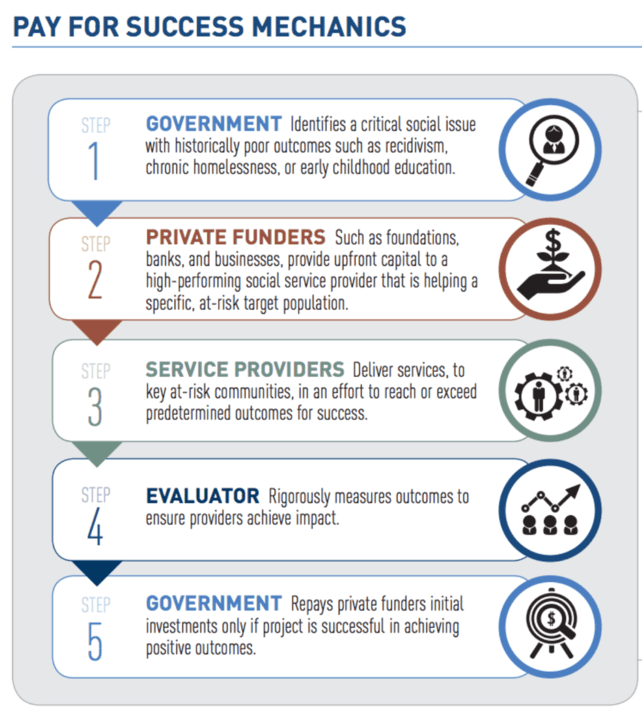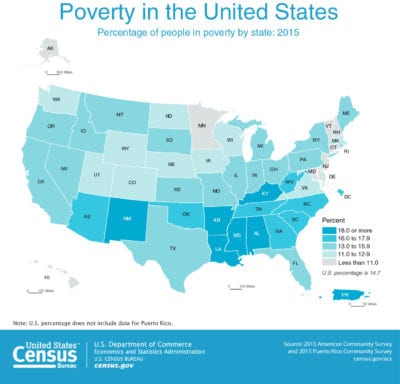Third Sector Joins Actionable Intelligence for Social Policy to Implement Integrated Performance Systems
Third Sector announces partnership with Actionable Intelligence for Social Policy (AISP) at the University of Pennsylvania to offer complementary training on the development of Integrated Data Systems (IDS) infrastructure and outcomes-contracting services, which will jointly increase government’s ability to use data-driven decision-making to improve results for vulnerable populations.
Innovative Data Sharing Practices Shaping the Social Sector
Data and evaluation play a critical role in our work at Third Sector, enabling rigorous outcomes-oriented contracting. More broadly throughout the social sector, well-designed approaches can inform the implementation of policy and programs. The National Association of Welfare Research Statistics (NAWRS) 2017 Workshop highlighted communities across the country where innovative data sharing practices and evaluation methodologies are directly shaping human services and workforce programming. Integrated data systems to understand cross-system risk factors: Allegheny County is a leader in the development and use of integrated data systems. The Allegheny County Department …
Using Pay For Success to Improve Youth Outcomes A Review of Third Sector Capital Partner’s First Cohort of SIF Sub-Recipients
The following post originally appeared on America Forward’s Blog as a guest post. Less than 10 years ago, the phrase Pay for Success was virtually unknown in most circles—particularly government circles. Though a seemingly simple concept, an approach to contracting for services where payments from governments (or other end-payers interested in supporting the achievement of measurable outcomes related to public programs) are linked to positive outcomes that have been measured and evaluated—Pay for Success is being tested, applied, and replicated at a rapid pace. Contributing to the interest and uptake …
Process Evaluation An Intermediate Step to Gauge Outcomes and Expedite the Feedback Loop
Thanks to innovations in outcomes-focused contracting “because that’s the way we’ve always done it” is no longer an acceptable reason to continue to operate social programs the same way every year hoping for better results. By linking payments to measurable social outcomes, Pay for Success (PFS) contracting has made data and results integral aspects of any social service. Through multi-year randomized control trials (RCTs), which test the outcomes of a PFS project, social service providers and government funders can finally quantify the impact that their programs are making in the …
Pandemic Emergency Finance Bonds
A few weeks ago, the World Bank launched the Pandemic Emergency Financing Facility” (PEF).[1] It is an exciting example of social financing supporting outcomes at scale. Here’s how it works. It has raised $425m via bonds and swaps. If no pandemic occurs, investors will be repaid their principal in full, plus a return. If a pandemic occurs, then investor principal will be instead used to quickly respond to the crisis. In short, the PEF functions as a kind of insurance that kicks in in the event of a bad outcome. …
Innovations in PFS Using WIOA Pay for Performance to Improve Workforce Outcomes
This article originally appeared on the Living Cities’ blog as a part of their new series which celebrates the five year anniversary of their first PFS project, and shares reflections from them and their partners on new directions in PFS. For updates, follow their Pay for Success Newsletter. Nearly one in every seven youth and young adults across the United States are neither employed nor in school. Nationwide, this amounts to approximately six million disconnected or “opportunity youth” who face barriers to employment, including limited community resources, low-performing schools, and inadequate assistance …
Video: Enhancing Evaluation Practices in the Public & Social Sectors
Check out our submission to the American Evaluation Association’s Evaluation 2017 Video Contest! Share using this link: https://youtu.be/eg3vnwaq3EE http://www.thirdsectorcap.org/wp-content/uploads/2017/06/TSCP-Eval-2017-V1-Full-Music-50MB.mp4
Social Impact Accounting The Future Benchmark of Impact and Performance Measurement?
For the past five months, I’ve been helping Third Sector research the nascent field of social impact accounting – the practice of measuring and quantifying the social impact of organizations and investments. Third Sector was interested in exploring the demand for social impact accounting among investors and philanthropic organizations, as well as investigating opportunities to apply the lessons the firm has learned from its Pay for Success work more broadly. While generalized social impact accounting principles are accepted and widely used today, they are a relatively recent development: The Financial …
SIM TIG Week: The Pay for Success Model
This post originally appeared on the AEA365 blog as part of their SIM TIG Week. Hello! We are Brian Beachkofski and Jeannie Friedman, Pay for Success (PFS) advisors at Third Sector Capital Partners. We spend most of our time assessing feasibility and designing social sector programs with rigorous evaluations and evidence-based interventions embedded into their contracting structure. PFS is an innovative contracting model (shown in the figure below) that drives government resources toward high-performing social programs. The PFS model is designed to merge performance measurement using administrative data and rigorous …
Data at Scale Why we’re excited about administrative data and our government partners in the Administrative Data Pilot
The prevalence of data in the social sector means that government agencies and nonprofit providers, in theory, have a wealth of information at their disposal to understand what works and more effectively deploy resources to achieve better outcomes. Administrative data (data collected by governments or nonprofits as part of administering a specific program) in particular provides a cost-effective and accurate way to understand participant outcomes and break the silos between agencies serving similar populations who operate in different policy domains. The practical reality is that providers and government agencies cannot …
Evidence in Action Strengthening Workforce Development through Pay for Performance
This article originally appeared on America Forward’s blog as a part of their Evidence in Action series. Follow along on Twitter with #EvidenceinAction and catch up on the series here. Thanks to the persistence of social entrepreneurs across the country, every day we see strategies that are working and delivering results in a rapidly changing world. This Evidence in Action blog series highlights the voices of the more than 70 social innovation organizations that make up the America Forward Coalition, the results-driven solutions our community has for our country’s most pressing …
Strategies for Elevating Social Impact Three Lessons from the Wharton Social Impact Conference
Social impact is a dynamic and growing field, with many different types of actors who each have unique strategies and goals. The Wharton Social Impact Conference, hosted by the Wharton Social Impact Initiative, brought together leaders in the space to discuss their approaches, emphasizing innovative tools and models. While social impact crosses fields, many practitioners are thinking about common themes, directly related to our work at Third Sector. As we bring together stakeholders to orient social services towards outcomes, we often think about how to best leverage data, the long-term …
The Next Phase of Pay for Success Driving Public Sector Outcomes
When we started Third Sector six years ago, my co-founders and I had a fundamental assumption: the increasing availability of data would empower government to allocate its resources to programs that measurably improve lives. We began by testing Pay for Success (PFS) as a contracting tool to catalyze this shift. Six years and six PFS contracts later, we are proud of our work reallocating over $100M in public sector funding to outcomes-driven programs. But we have also found our central assumption challenged in three ways: Public sector data infrastructure is …
Stanford and Third Sector Launch Partnerships for Economic Opportunity
Third Sector Capital Partners and the Stanford Center on Poverty and Inequality will provide assistance in evaluating social programs that address homelessness, unemployment, and family disadvantage. The Stanford Center on Poverty and Inequality and Third Sector Capital Partners have joined with three state and local governments to develop a new big-data infrastructure for evaluating programs that aim to increase economic opportunity. The San Diego County Health and Human Services Agency, the Santa Cruz Human Services Department, and the Washington Department of Early Learning will receive research and development support …
Creating Positive Change with Data and Evaluation – Part III: Impact Evaluation
Brian Beachkofski leads Third Sector’s efforts in data, evaluation, and modeling to include developing and executing strategy, capturing best practices, and providing training. This post is based off a recent speech I made at the Harvard University Center on Education Policy Research for a meeting of the Proving Ground partners. Proving Ground is an initiative committed to helping education agencies meet their practical needs, by making evidence cheaper, faster, and easier to use. Their goal is to make evidence-gathering and evidence-use an intuitive part of how education agencies conduct their …
Creating Positive Change with Data and Evaluation – Part II: Incentive Alignment
Brian Beachkofski leads Third Sector’s efforts in data, evaluation, and modeling to include developing and executing strategy, capturing best practices, and providing training. This post is based off a recent speech I made at the Harvard University Center on Education Policy Research for a meeting of the Proving Ground partners. Proving Ground is an initiative committed to helping education agencies meet their practical needs, by making evidence cheaper, faster, and easier to use. Their goal is to make evidence-gathering and evidence-use an intuitive part of how education agencies conduct their …
Creating Positive Change with Data and Evaluation – Part I
Brian Beachkofski leads Third Sector’s efforts in data, evaluation, and modeling to include developing and executing strategy, capturing best practices, and providing training. This post is based off a recent speech I made at the Harvard University Center on Education Policy Research for a meeting of the Proving Ground partners. Proving Ground is an initiative committed to helping education agencies meet their practical needs, by making evidence cheaper, faster, and easier to use. Their goal is to make evidence-gathering and evidence-use an intuitive part of how education agencies conduct their …
The Unique Value of PFS for Asia
The Pay for Success (PFS) movement has spread to countries around the world. Each country has done PFS for slightly different reasons. For example: in the United Kingdom, PFS has generally angled as a way to get ‘more for less’, whereas in the US, PFS has been viewed by many as a way to test and scale up innovative social programs. I grew up in Singapore and Hong Kong, and have spent the past two years executing PFS projects around the US. I believe that PFS could provide a unique …
Third Sector Capital Partners Announces New CEO Caroline Whistler
Third Sector Capital Partners, Inc. (Third Sector) Board of Directors formally announced today new roles for co-founders Caroline Whistler and George Overholser. Beginning March 15, 2017, Caroline Whistler will be promoted to President and Chief Executive Officer (CEO), and George Overholser will transition from his current role as CEO to Board Chair. Whistler and Overholser, along with Third Sector board member Drew von Glahn, established the organization in 2011 to accelerate America’s transition to a performance-driven social sector. As leading innovators and implementers in the field of outcomes-based social policy, …
Illinois Announces Pay for Success Initiative for Dually-Involved Youth
Rauner Administration Moves to Improve Outcomes for Dually-Involved Youth Pay for Success initiative aims to reduce stays in institutional care, prevent repeat criminal behavior CHICAGO – Governor Bruce Rauner and Illinois Department of Children and Family Services (DCFS) Director George Sheldon today announced the next step to improving outcomes for youth who are involved in both the child welfare and juvenile justice systems through a first-of-its-kind pay for success initiative. “Many youth in the juvenile justice system have endured a breakdown in their families,” said Governor Rauner. “This project is …





